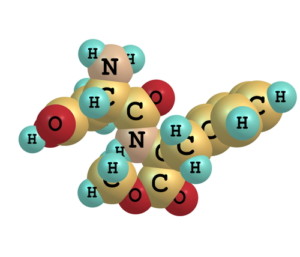What is Aspartame?

Aspartame is a nutritive sweetener that provides the sweet taste of sugar at a fraction of the calories. It is a combination of the amino acids aspartic acid and phenylalanine, as the methyl ester. Aspartame, discovered almost 30 years ago, is now a widely accepted sweetener and is used by millions of Americans every day.
Reports from the Centers for Disease Control (CDC) and the Food and Drug Administration (FDA) state that the scientific evidence, including studies of a wide variety of ages and types of people, often using extremely large amounts of aspartame, supports the fact that consuming products sweetened with aspartame is no different than consuming other foods. Aspartame has been approved for use in over 90 countries.
It is also stated that individuals with a rare genetic disease called phenylketonuria (PKU), need to be aware that aspartame is a source of the protein component, phenylalanine. Those who have PKU cannot properly metabolize phenylalanine and must monitor their intake of phenylalanine from all foods, including foods containing aspartame.
Other Studies
Studies have shown that when the temperature of aspartame exceeds 86 degrees F, the wood alcohol in aspartame converts to formaldehyde and then to formic acid, which in turn causes metabolic acidosis. (Formic acid is the poison found in the sting of fire ants). The methanol toxicity mimics multiple sclerosis; thus, some people were diagnosed with multiple sclerosis in error. Multiple sclerosis is not a death sentence, unlike methanol toxicity, which is the cause. This methanol toxicity has been found when the victim drinks a lot of Diet Coke and Diet Pepsi, usually three to four 12-oz cans. cans of them a day, some even more.
In the case of someone who has systemic lupus, it can be triggered by aspartame. The victim usually does not know that the aspartame is the culprit. The victim continues to use it, aggravating the lupus to such a degree that sometimes it becomes life-threatening. When we get people off the aspartame, those with systemic lupus usually become asymptomatic.
This also applies to cases of tinnitus.
The Atkins Diet Center has done research that indicates sweeteners that contain aspartame (such as NutraSweet and Equal) stimulate insulin production (leading to unstable blood sugar, irritability, and carbohydrate cravings). Sweeteners that use sucralose (marketed as Splenda) and saccharin (such as Sweet’n Low) have not been shown to stimulate insulin production.
Studes now show its use may disrupt the oxidant/antioxidant balance, induce oxidative stress, and damage cell membrane integrity, potentially affecting a variety of cells and tissues and causing a deregulation of cellular function, ultimately leading to systemic inflammation.
If you are using aspartame (NutraSweet, Equal, Spoonful, etc.) and you suffer from spasms, shooting pains, numbness in your legs, cramps, vertigo, dizziness, headaches, tinnitus, joint pain, depression, anxiety attacks, slurred speech, blurred vision, or memory loss, you might have aspartame toxicity.
One of the side effects is nerve damage from neuropathy. See the article on Neuropathy
How do you know if a product contains aspartame?
The word “aspartame” will be included in the product’s list of ingredients. If the product is sweetened exclusively with the NutraSweet® brand of aspartame, it will usually have the NutraSweet® logo and swirl on the front product panel.
Aminosweet® is a brand name for aspartame, a low-calorie sweetener.
The Ajinomoto Group, one of the largest producers of aspartame, rebranded their product as Aminosweet® in 2010 for marketing purposes. However, on food labels in the US and Canada, it must still be listed as aspartame.
The labeling in the US may have changed, of course, and we wanted you to know.
Why don’t you want Aspartame?
The Ajinomoto Group, one of the largest producers of aspartame, rebranded its product as Aminosweet® in 2010 for marketing purposes. However, on food labels in the US and Canada, it must still be listed as aspartame.
The labeling in the US may change, of course, and we wanted you to know.
See Also:
See Maltitol
See Saccharin
See Splenda
For a good source of Whole Food Supplements
Sign up to receive the MCVitamins Newsletter!
Up-to-date info on the latest health-related news happening in the world
(available in English only)

